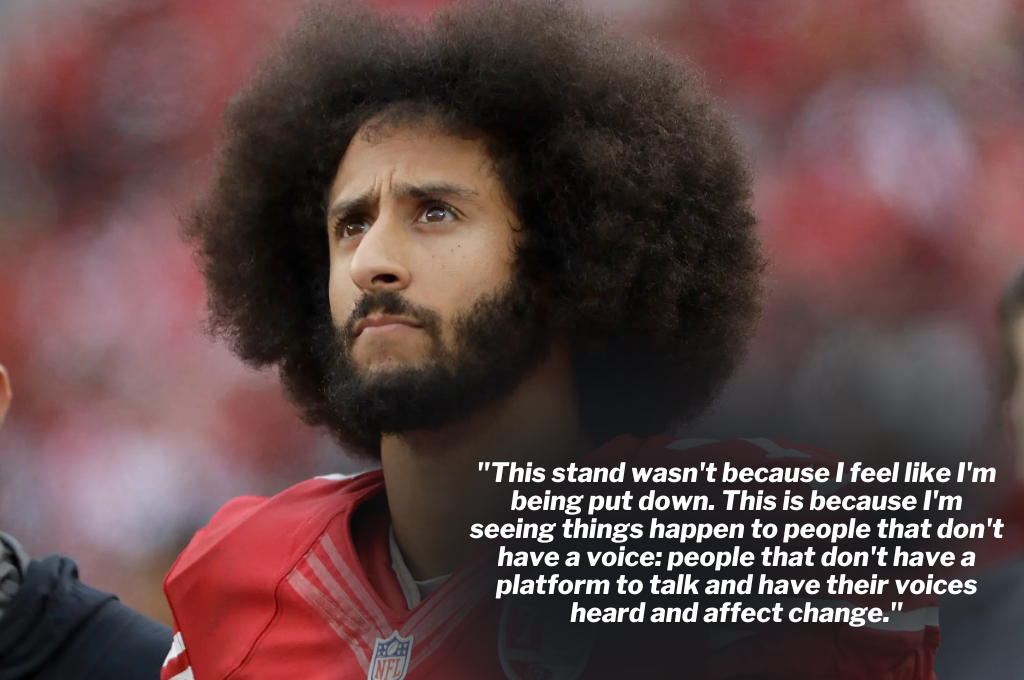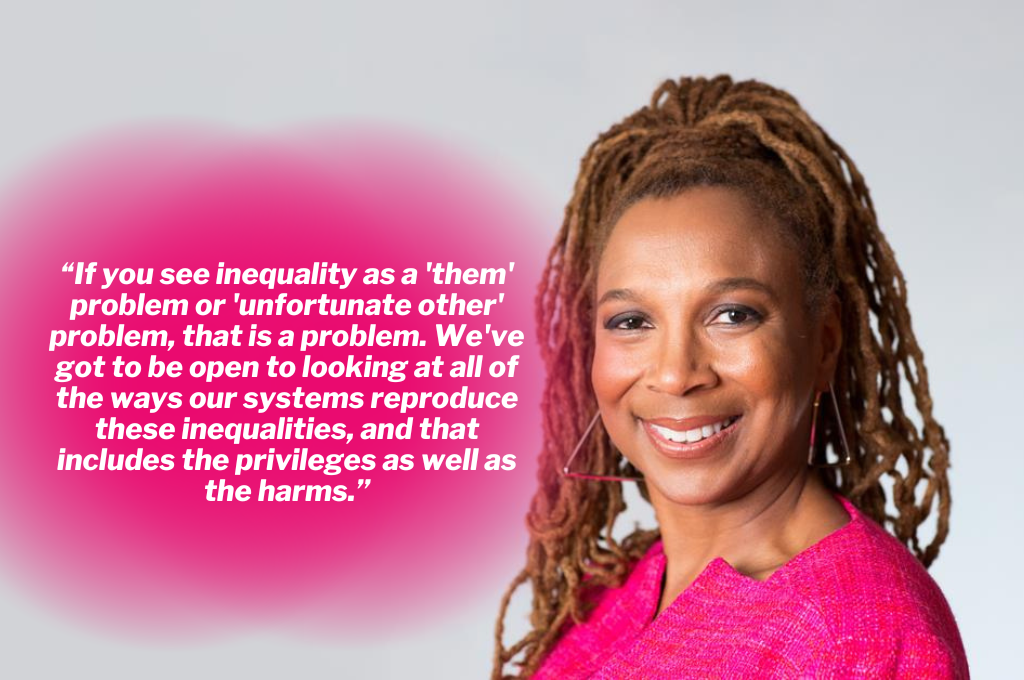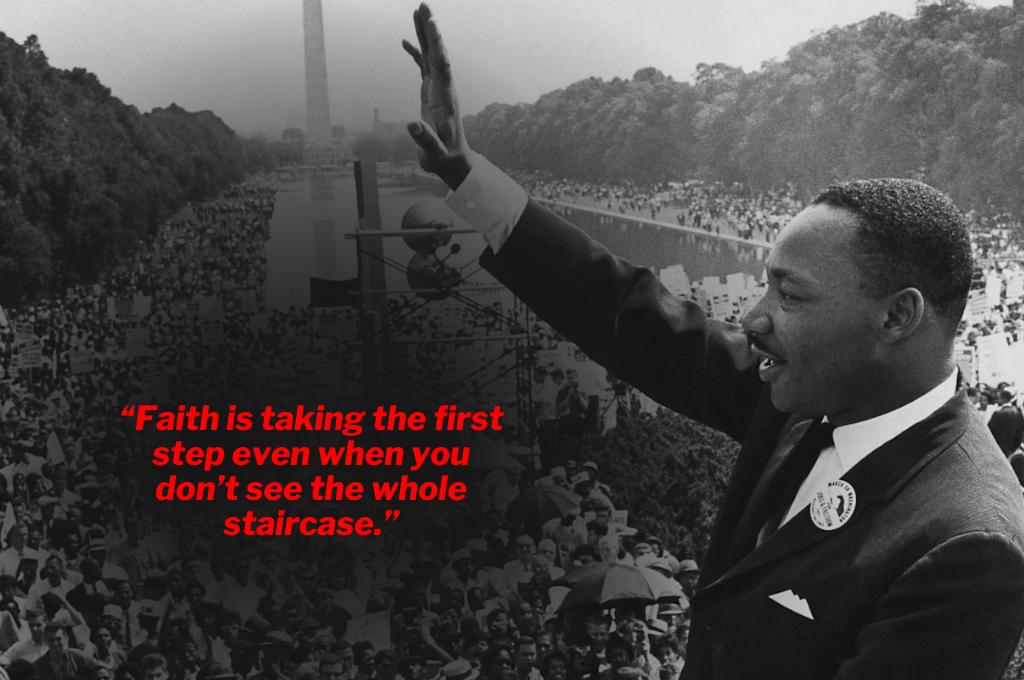MONDAY
Today is Dr. Martin Luther King, Jr. Day, a day that we, as a nation, set aside to honor and remember the legacy of one of our nation’s most important social justice champions. Dr. King was born into a segregated Atlanta, GA, on January 15, 1929. In 1954, he joined the leadership of the local NAACP chapter, the Montgomery Improvement Association. He helped create the Southern Christian Leadership Conference (SCLC), an organization formed to provide leadership for the burgeoning civil rights movement. He rose to the forefront of the civil rights movement in 1955 with the Montgomery bus boycott that followed the arrest of Rosa Parks, an African American woman who had violated the city’s racial segregation ordinances when she refused to give her seat on a bus to a white passenger. An advocate of Mahatma Gandhi’s philosophy of using nonviolent resistance to effect social change, King promoted the use of a nonviolent means to end racial segregation in the United States. In 1964 he was awarded the Nobel Prize for Peace for his efforts. He was assassinated in 1968. Learn more here.
This week, we will honor Dr. King’s legacy by featuring Black social justice pioneers who are following in his footsteps. Join us as we explore a new leader each day this week, and help us to honor Dr. King and those people who are working to continue his legacy.

TUESDAY
Amariyanna Copeny
15-year-old Amariyanna “Mari” Copeny hails from Flint, MI, and is most commonly known by the nickname “Little Miss Flint.” She first entered the public spotlight when she wrote to President Barack Obama, sharing details of the water crisis in Flint.
In early 2014, the City of Flint changed their municipal water supply source from the Detroit-supplied Lake Huron water to the Flint River, causing water pipes to corrode and leach lead and other contaminants into municipal drinking water. Despite the incredible danger and clear pollution of the water supply—which primarily served Black residents—the city of Flint was slow to act, eventually (in 2016) issuing a “do not drink” advisory regarding the water. Although the city reconnected to the original Detroit water system that same month, the potential damage was already done, and a state of emergency was declared on January 16, 2016. The water crisis in Flint—and the subsequent lack of response by city officials—proved to be a pattern of systemic environmental injustice towards Black and Brown communities in the United States. Numerous studies have revealed a pattern across the country: Certain communities are disproportionately burdened by environmental contamination and health risks. Like Flint, those places tend to be locations where people with lower incomes and people of color are concentrated.
Mari’s letter prompted President Obama to travel to Flint and survey the water crisis for himself, ultimately approving $100 million in relief for the city of Flint.
Mari continues to work for a socially just world, fighting for climate and environmental justice, anti-bullying, and empowering young people to use their voices for social justice causes.
Learn more: https://www.maricopeny.com/about

WEDNESDAY
Colin Kaepernick
In 2012, Colin Kaepernick became the starting quarterback for San Francisco 49ers. In that season, Kaepernick took the team to an 11–4–1 record, along with the 49ers first appearance in the Super Bowl in 18 years.
During the 2016 NFL preseason, Kaepernick began sitting during the playing of the National Anthem and later kneeling. He was quoted as saying, “I am not going to stand up to show pride in a flag for a country that oppresses Black people and people of color. To me, this is bigger than football.” As the season progressed, other NFL players and athletes in other sports began joining Kaepernick’s silent, respectful protest.
Despite his protest’s respectful, quiet nature—a Constitutionally protected right—Kaepernick’s actions made national headlines and elicited strong reactions from supporters and critics alike. Eventually, he was released from the 49ers and could not find a team to sign with; this ultimately led him to file a formal grievance accusing NFL team owners of conspiring to keep him out of the league. In June 2020, The New York Times wrote that the NFL had wrestled with the issue of race, noting that three-quarters of NFL players are African-American, yet nearly every NFL team owner is white (and several are prominent Trump supporters). It is undeniable that Kaepernick’s refusal to bow to pressure and insistence on living his truth led to the end of what should have been a long, promising career.
Today, Kaepernick supports the abolition of police and prisons. He owns a publishing house, Kaepernick Publishing, which launched a project with Medium titled “Abolition For The People,” a collection of 30 essays written by several activists calling for police and prison abolition and criticizing prison reform as only “reforming, reshaping, and rebranding” systemic racism.
Learn more: https://kaepernick7.com/

THURSDAY
Amanda Gorman
Amanda Gorman is an award-winning writer and cum laude graduate of Harvard University. Although writing from a young age, Gorman largely came to the nation’s attention when she became the youngest inaugural poet in U.S. history, reading her work “The Hill We Climb” during President Joe Biden’s swearing-in ceremony in Washington.
Gorman focuses her work on many topics, including slavery and social issues, finding that her writing gave her the freedom and agency to candidly speak her mind. She regularly pushes herself to write about the social issues she considers important, saying, “I believe that poetry is the language of the people. Poetry is not like prose because it inherently challenges you to break from the norms of convention. You are supposed to play with grammar; you are supposed to play with language and metaphors, and similes. It is automatically a type of rebellion against the literary status quo.” Gorman continues, “Across the continuum of time, activism has really been that needle that has been threading the tapestry of progress.”
Learn more: https://www.theamandagorman.com/

FRIDAY
Kimberlé Crenshaw
As a pioneer in critical race theory, Kimberlé Crenshaw coined the terms critical race theory and intersectionality, which helped open the discussion of the double bind faced by victims of simultaneous racial and gender prejudice. Crenshaw has worked extensively on various issues about gender and race in the domestic arena, including violence against women, structural racial inequality, and affirmative action.
Crenshaw’s studies, writing, and activism have identified key issues in the perpetuation of inequality, including the “school to prison pipeline” for African American children and the criminalization of behavior among Black teenage girls. Through the Columbia Law School African American Policy Forum (AAPF), which she co-founded, Crenshaw co-authored (with Andrea Ritchie) Say Her Name: Resisting Police Brutality Against Black Women. This act documented and drew attention to the killing of Black women and girls by police. Crenshaw and AAPF subsequently launched the #SayHerName campaign to call attention to police violence against Black women and girls.
Learn more: https://www.ted.com/speakers/kimberle_crenshaw
